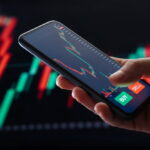Economic crises are periods of significant decline in economic activity, output, and income. Most time, they source from external shocks, such as wars, pandemics, natural disasters, or financial collapses. Economic crises can have a profound impact on the global financial markets, including the foreign exchange (forex) market, which is the largest and most liquid market in the world.
In this article, we will talk about the opportunities and risks associated with forex trading during economic crises. Pay attention, and don’t miss out on anything!
Understanding the Landscape
In times of economic upheaval, the forex market becomes a dynamic arena with heightened volatility. Traders navigate this landscape with the aim of capitalizing on market fluctuations. Top forex brokers also embody the core strategy, emphasizing the significance of trustworthy platforms.
These brokers serve as pillars of stability, offering advanced tools to help traders’ weather financial storms. So, your success lies in comprehending the nuances of this ever-shifting landscape, where opportunities emerge amid the challenges. In short, astute traders recognize the importance of aligning themselves with top forex brokers, establishing a solid foundation for strategic decision-making in the face of economic uncertainties. Though they may seem trivial, these little things will set you apart in times of economic hardship.
Why People Capitalize on Forex Trading During Economic Crises
There has to be a reason why people want to trade during economic crises, right? Well, we will look into that below:
High volatility
Economic crises can create high volatility in the forex market, as currencies react to the changing economic conditions, expectations, and sentiments of the market participants. High volatility can create large price movements and trading opportunities for traders who can anticipate and capture them.
Diversification
Economic crises can affect different countries and regions differently, depending on their economic structure, resilience, and policy response. This can create divergence and diversity in the performance of different currencies, which can offer traders a chance to diversify their portfolio and hedge their risks.
For example, during the coronavirus pandemic of 2020, some currencies, such as the US dollar, the Japanese yen, and the Swiss franc, acted as safe havens, while others, such as the Australian dollar, the Canadian dollar, and the Norwegian krone, suffered from the decline in global trade and commodity prices.
Accessibility
Economic crises can also make forex trading more accessible and affordable for traders, as many online platforms and brokers offer low-cost and user-friendly services to trade forex. Forex trading can be done 24 hours a day, five days a week, from anywhere in the world, with a computer and an internet connection.
Tips for Forex Trading During Economic Crises
- Choose a reliable and regulated broker: One of the most important steps for forex trading during economic crises is to choose a trustworthy and reputable broker that can provide you with a secure and stable trading environment, as well as competitive trading conditions, such as low spreads, fast execution, and high leverage.
- Do your research and analysis: Another crucial step for forex trading during economic crises is to do your homework and analysis, and stay updated with the latest economic and market developments, trends, and news. You can use various sources of information, such as economic calendars, charts, indicators, reports, and forecasts, to analyze the fundamentals and technical of the forex market, and identify the best trading opportunities and risks.
- Manage your risk and money: A final essential step for forex trading during economic crises is to manage your risk and money, and protect your capital and profits. You can use various methods and techniques, such as stop-loss, trailing stops, take-profit, position sizing, and diversification, to limit your losses, lock in your gains, and optimize your risk-reward ratio.
Conclusion
Forex trading during economic crises can be a rewarding and challenging activity, as it can offer both opportunities and risks for traders. Traders need to be aware of the pros and cons of forex trading during economic crises, and follow some tips and best practices to trade successfully in such volatile and uncertain times.




